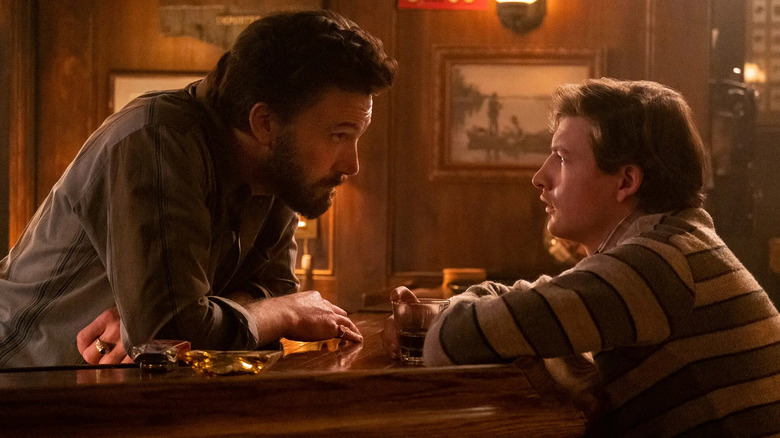The Tender Bar Review: A Well Drink In A Fancy Glass
A film content to take a snapshot rather than tell a story, "The Tender Bar" is like a time machine that brings you back to a '70s/'80s reality where everything feels so authentic you can smell the cigarettes. But is it worth the trip? That, and what you make of the film's central performance by Ben Affleck, is largely a matter of preference.
Featuring a "Wonder Years"-type voiceover (from Ron Livingston) looking back on his formative years with a mixture of fondness and regret, the film follows "JR," played by Daniel Ranieri as a youngster and Tye Sheridan from college and beyond. As we enter the story, JR's mom (Lily Rabe) is swallowing her pride and moving back in with Grandpa (Christopher Lloyd), whose big old house supports pretty much the entire family. By the time we leave the story, it's about 15 years later and JR is heading out into the world to become a writer.
But where's the tension in this coming-of-age tale? What makes this, in particular, a story worth telling? If you know anything about "Tender," you might bring enough to the film to make such questions less troublesome. J.R. Moehringer wrote the memoir on which the film is based, and he did indeed become an accomplished writer who in 2000 won a Pulitzer Prize for his portrait of Gee's Bend in Alabama, where descendants of slaves navigate a difficult modern legacy. But if you only watch "The Tender Bar," you'll learn none of this. In fact, not a single substantial word of JR's prose is presented; the only indication we have that he's a good writer is that a few other characters tell him he is.
His love of writing — and many other lessons on how to drink, smoke and act like a man — are instilled in him at the Dickens, a bar owned and operated by his Uncle Charlie (Affleck). His uncle is a foul-mouthed, hard-partying, blue-collar lover of a good story who takes pride in his unpolished ways and has a lovable heart if you hang in there long enough to know him. Essentially, it's the same character Affleck played in "Good Will Hunting," aged a couple decades.
Over the line
The obstacles to overcome in the film are threefold, and none of them are particularly satisfying in their resolution. JR's father is a deadbeat alcoholic known as "The Voice" (Max Martini) because he's a local DJ who exists in the child's life as little more than someone he can listen to on the radio (when mom isn't around). The love of JR's life is Sidney (Briana Middleton), a smart, free-spirited college student who treats his heart like a pair of rented bowling shoes. The third obstacle — and perhaps hardest to overcome — would be the alcoholism, abuse, and general lack of direction which seem to be inherited by members of his family.
So if you're in the market for a film about a guy trying to decide whether he'll become an alcoholic, hopelessly in love with a woman who doesn't love him back, obsessing over a father who clearly doesn't have the drive, desire, or ability to mend fences with him, get ready for your next favorite movie. If not, you'll be wondering why director George Clooney, writer William Monahan, Affleck, and all the others chose this particular tale as one worthy of their time.
Nevertheless, it is the talent that elevates this film above standard coming-of-age fare. "The Tender Bar" never met a '70s curio it didn't want to linger upon; candlepin bowling, classic cars, leather jackets, garish clothes, and crumpled packs of cigarettes feel as much like characters as anyone who speaks a line. The movie both understands and relishes the sounds of assembled family under the same roof — the sniping comments, the unspoken moments of affection, the sighs and winks that speak volumes. Clooney is confident enough (likely because he's been a huge star for so long) to build this world without overwhelming it, to be there without constantly reminding us he's there, and to present his story with a great, if somewhat predictable (he uses "50 Ways to Leave Your Lover" to punctuate a scene where ... somebody leaves their lover) period soundtrack.
A muddled message
The acting is solid across the board, and the dialogue frequently rises to the next level. Ranieri (in his acting debut) is particularly sweet, wide-eyed and heartbreaking as one adult after another lets him down; a scene where he sits on his front stoop, eagerly awaiting a Mets game with the father who never comes to get him, is brutal. Another standout is Rhenzy Feliz ("Runaways") as JR's roommate Wesley, who always seem to have something clever and insightful to offer in what could have easily been a thankless, generic role. Christopher Lloyd has a too-brief, tender-hearted storyline where he steps up and assumes the role of father figure in JR's life for one shining moment, and Middleton is an entertainingly unbridled, defiant love interest. Martini does good work in a handful of scenes as the film's despicable, cruel cautionary tale.
But the Uncle Charlie role is undoubtedly the showiest. It's this film's version of a Mr. Miyagi, dispensing barstool wisdom and taking down the occasional hater who underestimates him or his padawan. The role feels like it could have been better served by a whole host of actors with more shades of complexity to them. Watch the movie and imagine John C. Reilly in that role, or Tom Hardy, or Shea Whigham, or Walton Goggins, or someone of that ilk. Affleck doesn't bring much to it that we haven't seen from him before — it's just that now he's a little older, a little less vainglorious perhaps, but still very much Ben Affleck doing the Ben Affleck thing.
As the credits roll and "The Tender Bar" appears in the rearview mirror, what lingers is the time, the place, the essence, and the attitude. Kudos to Clooney, as well as the location and costume and set design people who very much brought this film to life. But at the end of the day, this just doesn't feel like a tale worth an hour and 45 minutes of your time. Tales of broken homes and difficult childhoods are, unfortunately, easy to find. Tales of kids from difficult backgrounds making something of themselves are, fortunately, also plentiful. "The Tender Bar" is a bit like sitting down at a stool next to a drunken stranger — what you get is a tale too long, undeservingly confident in its own significance, and headed nowhere.


